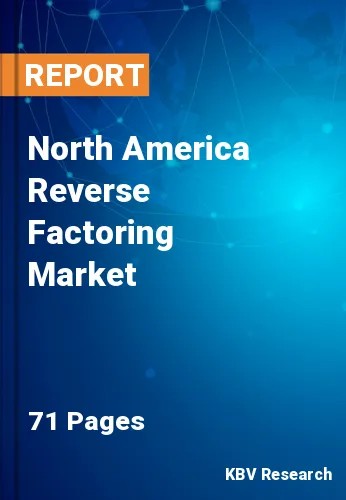The North America Reverse Factoring Market would witness market growth of 11.5% CAGR during the forecast period (2023-2029).
Specifically created for small and medium businesses, reverse factoring is essentially a buyer-led financing product that optimizes working capital by paying numerous suppliers early. In addition, it enables credit-worthy purchasers to postpone payment. With this approach, unlike traditional factoring, the buyer can routinely authorize the invoice for reimbursement and submit a funding request to a lender. Because of the buyer's creditworthiness, the financier is able to pay the suppliers at a reduced borrowing cost. Reverse factoring is additionally referred to as accounts payable finance.
The reverse factoring process is comparable to factoring in that three parties are involved: the ordering party (the client), the factor, and the supplier. Again, similar to conventional factoring, the aim of the procedure is to have a financier (the factor) finance the receivables of the supplier so that the supplier can receive payment for what they sold right away.
This has also been garnering attention from the government authorities. For example, in 2021, the Export-Import Bank of the United States (EXIM) Board of Directors approved the Supply Chain Finance Guarantee Program to renew a 90 percent guarantee on a $180 million purchase facility. The deal will enable CFM International, Inc. of Cincinnati, Ohio, to sell aircraft engines to The Boeing Company for export use.
With the COVID-19 outbreak still affecting the commercial loan sector, especially in industries like aviation that were severely damaged by the pandemic, EXIM's guarantee will help to sustain American jobs even more. EXIM predicts that the facility's renovation will support 353 million dollars in export sales as well as 600 American jobs, including those at companies that are part of the supply chain for the aircraft manufacturing industry. Therefore, the region presents lucrative growth prospects for the market's growth.
The US market dominated the North America Reverse Factoring Market by Country in 2022 and would continue to be a dominant market till 2029; thereby, achieving a market value of $192.5 Billion by 2029. The Canada market is anticipated to grow at a CAGR of 14.1% during (2023 - 2029). Additionally, The Mexico market would witness a CAGR of 13.1% during (2023 - 2029).
Based on Category, the market is segmented into Domestic and International. Based on Financial Institution, the market is segmented into Banks and Non-banking Financial Institutions. Based on End-use, the market is segmented into Manufacturing, Transport & Logistics, Information Technology, Healthcare, Construction and Others. Based on countries, the market is segmented into U.S., Mexico, Canada, and Rest of North America.
Free Valuable Insights: The Worldwide Reverse Factoring Market is Projected to reach USD 1041.5 Billion by 2029, at a CAGR of 11.3%
The market research report covers the analysis of key stake holders of the market. Key companies profiled in the report include HSBC Holdings plc, Barclays PLC, JPMorgan Chase & Co., Banco Bilbao Vizcaya Argentaria SA, Deutsche Factoring Bank GmbH & Co. KG (Deutsche Leasing), Drip Capital Inc., PrimeRevenue, Inc., Trade Finance Global, Tradewind GmbH, and Credit Suisse Group AG.
By Category
By Financial Institution
By End-use
By Country
Our team of dedicated experts can provide you with attractive expansion opportunities for your business.

